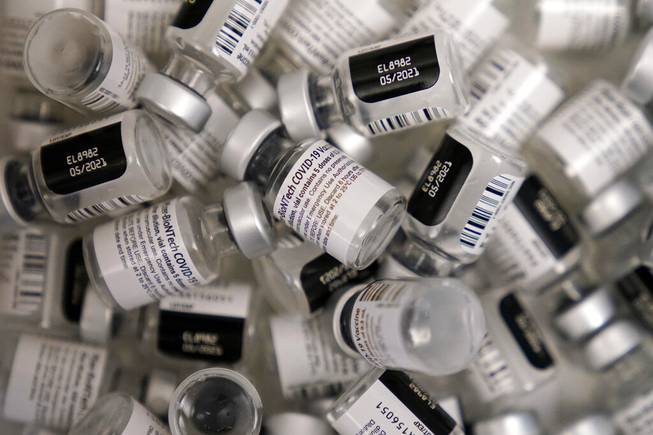
John Locher / AP
In this Friday, Jan. 22, 2021, file photo, empty vials of the Pfizer-BioNTech COVID-19 vaccine are seen at a vaccination center at UNLV.
Friday, Feb. 12, 2021 | 2 a.m.
View more of the Sun's opinion section
It doesn’t take expertise in statistical analysis to see an alarming degree of ethnic inequity in the distribution of COVID-19 vaccines in the Las Vegas Valley.
The proof is evident in mapping by the Southern Nevada Health District that breaks down Clark County’s ZIP codes based on infection rates and doses of vaccines administered. The maps reveal that residents in areas with the highest infection rates, generally in portions of central and northeastern Las Vegas with high percentages of communities of color, have received comparatively low amounts of doses. Conversely, vaccine distribution is high among Las Vegans in western and southern ZIP codes that are largely white and have relatively low infection rates.
This is deeply troubling, and it must be rectified immediately.
To their credit, state and local officials have recognized this and are taking corrective steps.
Gov. Steve Sisolak is addressing the imbalance through his Equity and Fairness Initiative, which he announced last week. The plan calls for the state to work closely with local health officials to monitor distribution and steer doses to populations in need. According to a news release, the goals are “to clarify prioritization lanes, support fair access to vaccines through site selection, and equitable allocation across communities.”
Meanwhile, the Southern Nevada Health Department has opened pop-up vaccination sites in communities of color and is planning to send special teams to especially hard-hit areas. Those are good steps. As local health officials have recognized, it’s not enough to simply offer mass vaccinations at a site like Cashman Field and expect everyone to show up.
We’re confident the situation can be improved, but Sisolak’s announcement calls for local leaders to rewrite their pandemic protocols to ensure this never happens again.
With vaccines in limited supplies thus far, it’s shameful that Black and Hispanic residents haven’t received a proportionate share of doses. And that’s definitely been the case. Data show that Blacks in the valley, who make up 12% of the overall population, received just 5.02% of the doses through Wednesday. Meanwhile just 10.68% of the doses went to Hispanics, who make up nearly 32% of the population. Those numbers don’t include vaccine recipients whose ethnicity was unknown, but they give a strong indication of the inequity.
Sadly, too, these numbers reflect similar circumstances in other communities and even national averages. Recent data from the Centers for Disease Control and Prevention showed that just 6% of vaccines had gone to Blacks and 11.5% to Hispanics nationwide, as opposed to 60% for whites.
Health experts say there are numerous reasons for this, many of which are related to systemic racial inequities. Especially in low-income communities, these barriers include poor access to hospitals and health care providers, higher uninsured rates and lack of adequate public transportation to obtain health care in other areas.
Another factor is suspicion of government vaccination programs and the medical system in general among American communities of color. That wariness is certainly historically justifiable, given that generations of Blacks, Hispanics and other minorities have endured discrimination, mistreatment and outright abuse at the hands of health care providers.
But it’s no excuse for the inequities in vaccinations. Rather, it underscores the need for educational outreach to ensure everyone in our community that the vaccines are safe and will be administered properly.
As is, the distribution imbalance in Las Vegas is grossly unfair. The areas with low vaccination rates are home to many working-class residents, many of whom are employed in frontline work that can’t be done remotely. These individuals are performing essential work and face a daily risk of contracting the coronavirus, yet they’re receiving less than their fair share of doses.
That not only runs counter to our community value of embracing our ethnic and cultural diversity, it’s detrimental to the health of everyone in Las Vegas, and not just the communities being subjected to the inequity. To protect public health, it’s critical to steer our ration of vaccinations to our most vulnerable residents and those performing essential work.
Las Vegas is better than this. Let’s fix this problem immediately and establish safeguards to prevent it from happening again.


